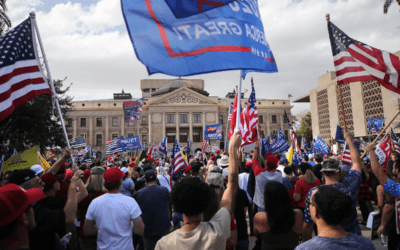
(Getty Images Photo/Patrick T. Fallon)
As Arizona’s hottest summer on record slowly comes to an end, local activists share their coping strategies for housing and climate anxiety.
Following the hottest month in Phoenix on record, Laura Pearl posted a TikTok expressing frustration and guilt about living through the historic heat wave.
“I just want to acknowledge how absolutely depressing it is to live in Phoenix, Arizona, right now,” Pearl said in the video posted on Aug. 6.
Pearl, a Phoenix native and executive director of a political nonprofit called Flip the Vote, said she made the video after thinking about how intolerable the heat is for people experiencing homelessness.
RELATED: Hobbs Demands Accountability From Utilities Amid Record Heat Wave
“It just feels really unbearable,” she told The Copper Courier. “And then you just start to spiral when you think about how hard it is for you, as a person with air conditioning, who can cough up a little extra for [your] energy bill and who works indoors.”
With temperatures still over 100 degrees for the foreseeable future, Arizonans are coping with the hopelessness that comes with living in extreme heat and watching others suffer while experiencing homelessness.
These feelings are often attributed to climate anxiety, which is defined as “distress related to worries about the effects of climate change,” according to Harvard Medical School. While not a mental illness, climate anxiety can result in feelings of grief, anger, guilt, and shame.
RELATED: Phoenix Police Pin Homelessness Advocate to Pavement Amid Heatwave
As of Sept. 7, Pearl’s TikTok received nearly 19,000 likes and around 2,000 comments expressing similar sentiments, demonstrating the widespread reach of climate anxiety.
“There’s some comfort in knowing you’re not alone in feeling a feeling, especially one that’s kind of novel and tied to something that’s more existential and hard to name,” Pearl said. “But it was also a little sad because there were comments like, ‘Well, this is the coolest summer for the rest of our lives.’ And you’re like, ‘Oh, man, that is true.’”
Pivoting to the Positive
Sheri Brown, a retreat leader at religious retreat center Spirit in the Desert, led a series this summer screening climate movies that are “hopeful” and “encouraging,” to help members of her church and community find relief from their climate anxiety.
Brown had been teaching a 12-week series on climate awareness when she realized that the group needed a break from hearing about the issues caused by climate change.
“It is essential for my mental health and the health of all of us who are engaged in this process to not feel isolated, and to be aware and to learn about efforts around the globe of hardworking, smart people who are putting together solutions for their ecosystems,” Brown said. “And hopefully, that can be scaled for much larger size solutions overall, for all of us.”
In the meantime, Brown said her main coping mechanism for climate anxiety is to stay informed and help educate others about climate issues.
“I realized that by becoming engaged in the [climate] work, I had a built-in antidote to despair,” Brown said.
Pearl said she finds that supporting her community members when possible through organizations like Mutual Aid Phoenix helps alleviate some of the guilt and shame associated with climate anxiety.
“People will post things if they need rent assistance or their AC broke, and people from across Phoenix will chip in and help people cover those little costs,” Pearl said. “And if it means I have $5, $10, $20, I can spare that day or week and someone else is going to, hopefully with collective action, have their really crappy circumstance be helped in some way. That helps me feel better.”
Fighting the Good Fight
For May Tiwamangkala, activism provides relief from the despair of climate anxiety. Tiwamangkala, who uses she/they pronouns, is the democracy defender director for Arizona AANHPI for Equity, a nonprofit that focuses on community organizing.
“My way to cope is through activism. [AZ AANHPI for Equity has] a climate justice campaign. We just did a town hall and we’ve done a climate summit this year, and [we are] just letting people know, especially in Arizona, what the issues are, letting people know the circumstances of people who are unhoused,” Tiwamangkala said.
Despite feeling the impacts of climate change, Tiwamangkala said they do have hope that improvements can be made to combat it, due to community organizing against large developments like the Tempe Entertainment District and the VAI Resort in Glendale that have an impact on both the state’s housing and water supply.
“I think if people pay attention more to local politics, they can see what’s being developed and they can show up at city council and say, ‘I don’t think this is good for our community.’” Tiwamangkala said.
Brown said talking about these issues, whether at city council or just among friends, is the first step toward alleviating feelings of hopelessness and addressing climate change.
“If we’re willing to let ourselves explore past our initial stress and shock and grief about what is happening, to begin to find a way to other people and to move ourselves out of our isolated fear, the better for our communities,” she said.
Subscribe to The Copper Courier’s daily newsletter! We keep it 💯—just like the temperature.

He said what? 10 things to know about RFK Jr.
The Kennedy family has long been considered “Democratic royalty.” But Robert F. Kennedy, Jr.—son of Robert F. Kennedy, who was assassinated while...

Here’s everything you need to know about this month’s Mercury retrograde
Does everything in your life feel a little more chaotic than usual? Or do you feel like misunderstandings are cropping up more frequently than they...

Arizona expects to be back at the center of election attacks. Its officials are going on offense
Republican Richer and Democrat Fontes are taking more aggressive steps than ever to rebuild trust with voters, knock down disinformation, and...

George Santos’ former treasurer running attack ads in Arizona with Dem-sounding PAC name
An unregistered, Republican-run political action committee from Texas with a deceptively Democratic name and ties to disgraced US Rep. George Santos...





